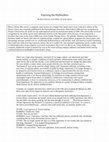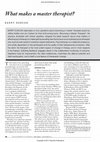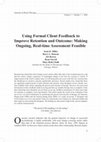Articles and Chapters by Barry Duncan
This chapters reviews the supervision literature and covers the four steps of PCOMS supervision.

This article, a magazine style version of a chapter that Jacqueline Sparks and I wrote in the fir... more This article, a magazine style version of a chapter that Jacqueline Sparks and I wrote in the first edition of The Heroic Client, was originally published in the Psychotherapy Networker, March/April 2000 and was recognized by Project Censored as one of the ten top underreported stories by mainstream media of 2000. This article also received recognition as one of the top ten most influential articles in the Networker’s first 20 years. It was inspired by a brochure that came in the June (1998) issue of the Family Therapy News. The splashy “Intimacy and Depression” brochure made our hearts sink when its exquisite design, original art, glossy photos, poignant text, heavy paper, and devastating message washed over us—profoundly disheartening us with the feel, look, and smell of creative marketing that could only come from big corporate money. But no it couldn’t be. Our national organization surely wouldn’t enter a relationship with a drug company or promote its products. Say it ain’t so. But it was. Glaxo Wellcome, a drug company, funded the project.It opened our eyes to the extent of drug company influence and fueled Jackie and my continued interest in mythmakers of psychiatric drugs.
Duncan, B. (2011). What therapists want. Psychotherapy Networker, May/June, 40-43, 47, 62.
Duncan... more Duncan, B. (2011). What therapists want. Psychotherapy Networker, May/June, 40-43, 47, 62.
Duncan, B. (2011). Opening a path. Psychotherapy Networker, May/June, 46-47.
These articles discuss what motivate therapists and how PCOMS can serve those motivations.

BARRY DUNCAN elaborates on four questions about becoming a 'master' therapist posed by Jeffrey Ko... more BARRY DUNCAN elaborates on four questions about becoming a 'master' therapist posed by Jeffrey Kottler and Jon Carlson for their forthcoming book, 'Becoming a Master Therapist'. His answers, illustrated with clinical vignettes, integrate the latest research about what matters in effective psychotherapy to challenge the prevailing view that to be an accomplished psychotherapist one must be well-versed in evidence-based treatments. Psychotherapy is a relational endeavour, one wholly dependent on the participants and the quality of their interpersonal connection. After the client, the therapist is the most potent aspect of change in therapy, and in most respects is the therapy. Soliciting feedback engages clients in the collaborative monitoring of outcome, heightens hope for improvement, fits client preferences, maximises the alliance potential and client participation, and is itself a core feature of therapeutic change.
Brief overview published in The Iowa Psychologist of the common factors and feedback effect.
THIS CHAPTER DISCUSSES
•The empirical evidence supporting a strengths-based approach
•Specific pr... more THIS CHAPTER DISCUSSES
•The empirical evidence supporting a strengths-based approach
•Specific practice guidelines for recruiting client resources to promote change
•The link between pluralistic counselling and a focus on client strengths
THIS CHAPTER DISCUSSES
•Systematic feedback and the Partners for Change Outcome Management System... more THIS CHAPTER DISCUSSES
•Systematic feedback and the Partners for Change Outcome Management System (PCOMS)
•PCOMS as a way to truly privilege clients, include them as full partners in decision-making and operationalize social justice and a pluralistic approach

This study examined gender differences in session one alliances and in the trajectory of the alli... more This study examined gender differences in session one alliances and in the trajectory of the alliance over the course of couple therapy. Additionally, this study examined the association between men and women's pre-therapy relationship adjustment and alliance at session one and over the course of therapy. A total of 316 couples seeking outpatient couple therapy were given the Locke–Wallace marital adjustment test at pre-therapy to measure relationship adjustment and the session rating scale after each session to measure alliance with the therapist. The results showed that men had lower alliance ratings after session one than women. Men's pre-therapy relationship adjustment was positively associated with their own session one alliance as well as their own alliance trajectory over the course of therapy. Men's pre-therapy relationship adjustment was also positively associated with their partner's session one alliance. Women's pre-therapy relationship adjustment showed no significant relationship with their own alliance or their partners at session one or the alliance trajectory over the course of therapy. The implications for how these gender differences may impact on the process of couple therapy with heterosexual couples are discussed.

Two continuous monitoring and feedback models have demonstrated gains in randomized clinical tria... more Two continuous monitoring and feedback models have demonstrated gains in randomized clinical trials (RCTs): Lambert's Outcome Questionnaire (OQ) System and the Partners for Change Outcome Management System (PCOMS). This article chronicles the evolution of PCOMS from a simple way to discuss the benefit of services with clients to its emergence as an evidenced based practice to improve outcomes. Although based in Lambert's model, several differences are described: PCOMS is integrated into the ongoing psychotherapy process and includes a transparent discussion of the feedback with the client; PCOMS assesses the alliance every session; and the Outcome Rating Scale, rather than a list of symptoms rated on a Likert Scale, is a clinical tool as well as an outcome instrument that requires collaboration with clients. The research supporting the psychometrics of the measures and the PCOMS intervention is presented and the clinical process summarised. Examples of successful transportation to public behav-ioural health are offered and an implementation process that values consumer involvement, recovery, social justice, and the needs of the front-line clinician is discussed. With now nine RCTs and American Psychological Association endorsements to support it, it is argued that client-based outcome feedback offers a pragmatic way to transport research to practice.
In K. J. Schneider, J.F. Pierson, & J.F.T. Bugental (Eds.) The Handbook of Humanistic Psychology (2nd Ed.), Sage Publishing Co.
This chapter reviews the clients who most impacted Barry Duncan's career and journey to a relatio... more This chapter reviews the clients who most impacted Barry Duncan's career and journey to a relational model of psychotherapy and away from a medical model. This chapter appeared in In K. J. Schneider, J.F. Pierson, & J.F.T. Bugental (Eds.) The Handbook of Humanistic Psychology (2nd Ed.), Sage Publishing Co.

Despite overall psychotherapy efficacy (Lambert, 2013), many clients do not benefit (Reese, Dunca... more Despite overall psychotherapy efficacy (Lambert, 2013), many clients do not benefit (Reese, Duncan, Bohanske, Owen, & Minami, 2014), dropouts are a problem (Swift & Greenberg, 2012), and therapists vary significantly in success rates (Baldwin & Imel, 2013), are poor judges of negative outcomes (Chapman et al., 2012), and grossly overestimate their effectiveness (Walfish, McAlister, O’Donnell, & Lambert, 2012). Systematic client feedback offers 1 solution (Duncan, 2014). Several feedback systems
have emerged (Castonguay, Barkham, Lutz, & McAleavey, 2013), but only 2 have randomized clinical trial support and are included in the Substance Abuse and Mental Health Administration’s National Registry of Evidence-Based Programs and Practices: The Outcome Questionnaire– 45.2 System (Lambert, 2010) and the Partners for Change Outcome Management System (PCOMS; Duncan, 2012). This article presents the current status of PCOMS, the psychometrics of the PCOMS measures, its empirical
support, and its clinical and training applications. Future directions and implications of PCOMS research, training, and practice are detailed. Finally, we propose that systematic feedback offers a way, via large-scale data collection, to reprioritize what matters to psychotherapy outcome, reclaim our empirically validated core values and identity, and change the conversation from a medical model dominated discourse to a more scientific, relational perspective.

This study investigated whether routine monitoring of client progress, often called "client feedb... more This study investigated whether routine monitoring of client progress, often called "client feedback," via an abbreviated version of the Partners for Change Outcome Management System (PCOMS) resulted in improved outcomes for soldiers receiving group treatment at an Army Substance Abuse Outpatient Treatment Program. Participants (N = 263) were active-duty male and female soldiers randomized into a group feedback condition (n = 137) or a group treatment-as-usual (TAU) condition (n = 126). Results indicated that clients in the feedback condition achieved significantly more improvement on the Outcome Rating Scale (d = 0.28), higher rates of clinically significant change, higher percentage of successful ratings by both clinicians and commanders, and attended significantly more sessions compared to the TAU condition. Despite a reduced PCOMS protocol and a limited duration of intervention, preliminary results suggest that the benefits of client feedback appear to extend to group psychotherapy with clients in the military struggling with substance abuse.

Policy makers and payers are insisting that to be paid, therapists must "deliver the goods." Conc... more Policy makers and payers are insisting that to be paid, therapists must "deliver the goods." Concurrently, there is a worldwide movement to involve consumers in their care. Consequently, the measurement of change, from the client's perspective, has become an important topic. Unfortunately, no self-report outcome measure has been available for children under 13. This article describes the development, validation, and psychometric properties of a brief outcome measure, the Child Outcome Rating Scale (CORS), for use with children 6-12 and their caretakers as well as the Outcome Rating Scale (ORS), for youth 13 and above and their caretakers. Results indicate that the CORS/ORS represent a balanced trade-off between the reliability and validity of longer measures, and the feasibility of these brief scales, and that youth do indeed deserve a voice in the delivery of services. We argue that outcome management is a pivotal part of delivering consumer-driven services, the therapeutic relationship, and change itself.
Journal of Family Psychotherapy, 2007
A critical review of three articles reveals flawed empirical evidence underpinning the case for i... more A critical review of three articles reveals flawed empirical evidence underpinning the case for integrating pharmacotherapy and psychotherapy. Medical model dominance favors biology in a diathesis/ stress framework, creating myths of valid diagnosis, underlying biological causes, and targeted pharmacological treatments. Meanwhile, a for-profit pharmaceutical industry influences clinical trials, constructing an illusory justification for medical intervention and bolstering the integration hypothesis. The apparent logic of integration threatens to diminish the crucial, empirically supported role of clients in psychotherapy outcome. The authors call for the inclusion of client feedback in intervention choices, based on accurate, unbiased information, and a continued critique of pharmacotherapy.
Most therapists aspire to become better at what they do. However, research has shown that persona... more Most therapists aspire to become better at what they do. However, research has shown that personal therapy has nothing to do with outcome; there are no therapeutic approaches, strategies or interventions shown to be better than any other; professional training and discipline do not matter much to outcome; there is no evidence to show that continuing professional education will improve effectiveness; and, although it defies common sense, experience does not improve outcomes either. So what does 'professional development' mean and how do we accomplish it? In this edited extract from his recent book, On Becoming a Better Therapist, BARRY DUNCAN explores how we can remember our original aspirations, continue to develop as therapists, and achieve better results more often with a wider variety of clients.

Policy makers and payers are insisting that to be paid, therapists must "deliver the goods." Conc... more Policy makers and payers are insisting that to be paid, therapists must "deliver the goods." Concurrently, there is a worldwide movement to involve consumers in their care. Consequently, the measurement of change, from the client's perspective, has become an important topic. Unfortunately, no self-report outcome measure has been available for children under 13. This article describes the development, validation, and psychometric properties of a brief outcome measure, the Child Outcome Rating Scale (CORS), for use with children 6-12 and their caretakers as well as the Outcome Rating Scale (ORS), for youth 13 and above and their caretakers. Results indicate that the CORS/ORS represent a balanced trade-off between the reliability and validity of longer measures, and the feasibility of these brief scales, and that youth do indeed deserve a voice in the delivery of services. We argue that outcome management is a pivotal part of delivering consumer-driven services, the therapeutic relationship, and change itself.

Research has found that client change occurs earlier rather than later in the treatment process, ... more Research has found that client change occurs earlier rather than later in the treatment process, and that the client's subject experience of meaningful change in the first few sessions is critical. If improvement in the client's subject sense of well-being does not occur in the first few sessions then the likelihood of a positive outcome significantly decreases. Recent studies have found that there are significant improvements in both retention and outcome when therapists receive formal, realtime feedback from clients regarding the process and outcome of therapy. However, the most used instruments in these feedback studies are long and take up valuable therapy time to complete. It has been found that most therapists are not likely to use any feedback instruments if it takes more than five minutes to complete, score and interpret. This article reports the results of an evaluation of the use of two very brief instruments for monitoring the process and outcome of therapy, the Outcome Rating Scale (ORS) and the Session Rating Scale (SRS), in a study involving 75 therapists and 6,424 clients over a two year period. These two instruments were found to be valid and reliable and had a high use-rate among the therapists. The findings are discussed in light of the current emphasis on evidence-based practice.
American Psychologist, 1987
... AUTHOR AFFILIATIONS. Barry L. Duncan, Dayton Institute for Family Therapy. M. Bernadine Parks... more ... AUTHOR AFFILIATIONS. Barry L. Duncan, Dayton Institute for Family Therapy. M. Bernadine Parks, Wright State University. Mary Ann Kraus, Bellefaire Residential Treatment Center, Shaker Heights, OH. © 1987 American Psychological Association. CITATION. ...











Uploads
Articles and Chapters by Barry Duncan
Duncan, B. (2011). Opening a path. Psychotherapy Networker, May/June, 46-47.
These articles discuss what motivate therapists and how PCOMS can serve those motivations.
•The empirical evidence supporting a strengths-based approach
•Specific practice guidelines for recruiting client resources to promote change
•The link between pluralistic counselling and a focus on client strengths
•Systematic feedback and the Partners for Change Outcome Management System (PCOMS)
•PCOMS as a way to truly privilege clients, include them as full partners in decision-making and operationalize social justice and a pluralistic approach
have emerged (Castonguay, Barkham, Lutz, & McAleavey, 2013), but only 2 have randomized clinical trial support and are included in the Substance Abuse and Mental Health Administration’s National Registry of Evidence-Based Programs and Practices: The Outcome Questionnaire– 45.2 System (Lambert, 2010) and the Partners for Change Outcome Management System (PCOMS; Duncan, 2012). This article presents the current status of PCOMS, the psychometrics of the PCOMS measures, its empirical
support, and its clinical and training applications. Future directions and implications of PCOMS research, training, and practice are detailed. Finally, we propose that systematic feedback offers a way, via large-scale data collection, to reprioritize what matters to psychotherapy outcome, reclaim our empirically validated core values and identity, and change the conversation from a medical model dominated discourse to a more scientific, relational perspective.
Duncan, B. (2011). Opening a path. Psychotherapy Networker, May/June, 46-47.
These articles discuss what motivate therapists and how PCOMS can serve those motivations.
•The empirical evidence supporting a strengths-based approach
•Specific practice guidelines for recruiting client resources to promote change
•The link between pluralistic counselling and a focus on client strengths
•Systematic feedback and the Partners for Change Outcome Management System (PCOMS)
•PCOMS as a way to truly privilege clients, include them as full partners in decision-making and operationalize social justice and a pluralistic approach
have emerged (Castonguay, Barkham, Lutz, & McAleavey, 2013), but only 2 have randomized clinical trial support and are included in the Substance Abuse and Mental Health Administration’s National Registry of Evidence-Based Programs and Practices: The Outcome Questionnaire– 45.2 System (Lambert, 2010) and the Partners for Change Outcome Management System (PCOMS; Duncan, 2012). This article presents the current status of PCOMS, the psychometrics of the PCOMS measures, its empirical
support, and its clinical and training applications. Future directions and implications of PCOMS research, training, and practice are detailed. Finally, we propose that systematic feedback offers a way, via large-scale data collection, to reprioritize what matters to psychotherapy outcome, reclaim our empirically validated core values and identity, and change the conversation from a medical model dominated discourse to a more scientific, relational perspective.